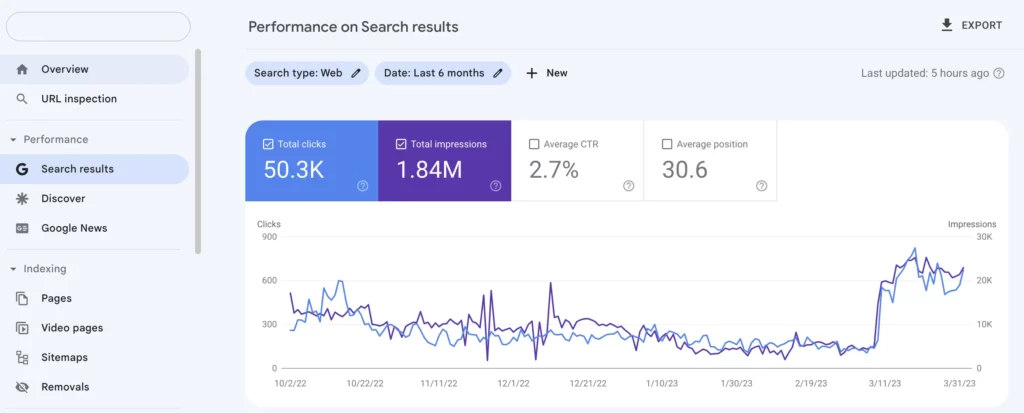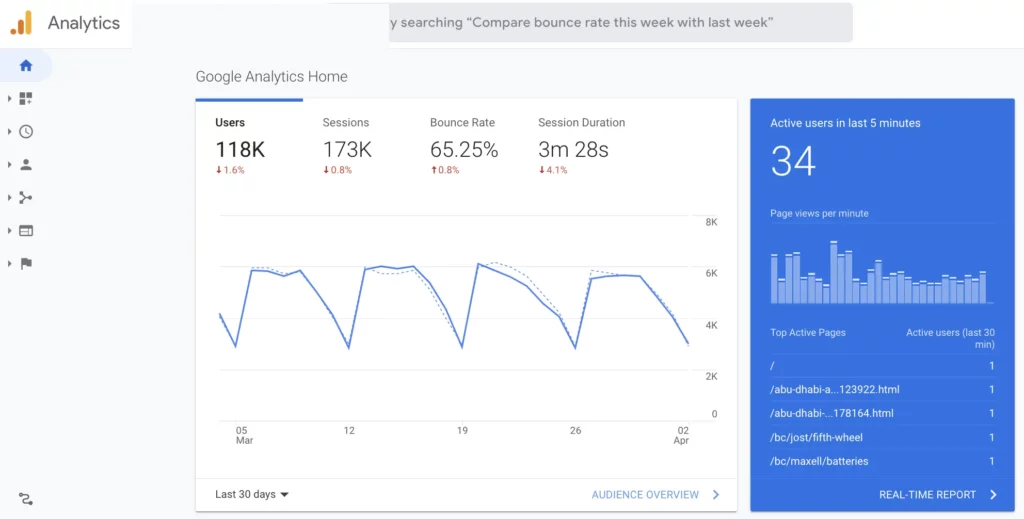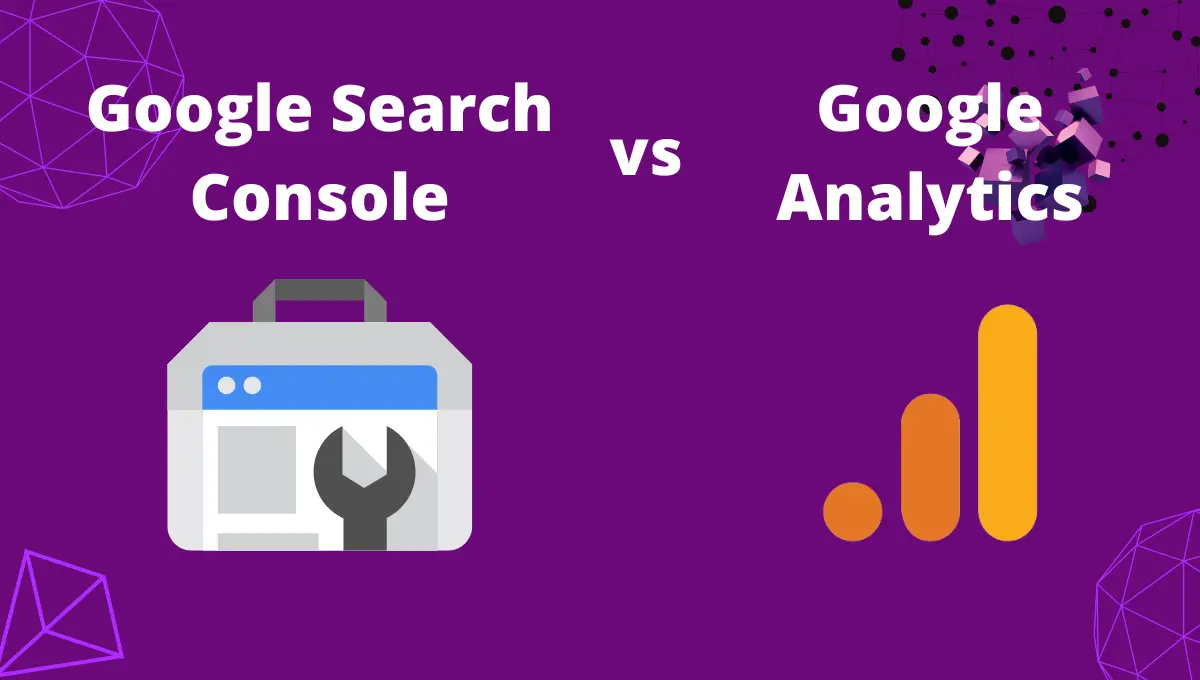Google Search Console is not the same thing as Google Analytics. Different information is provided for various uses.
While Google Analytics was developed to monitor user activity, Google Search Console was created to assist webmasters to rank higher in search engines.
These two systems stand independently, but when combined, they may perform incredible feats. Google Search Console ‘s information works with Google Analytics to provide a more complete picture of your users’ experience.
Google Search Console

It is important to note that Google Analytics and Google Search Console are complementary. In contrast, Google Search Console provides information about your site’s visibility in Google’s search results.
This information will prove invaluable when you work on SEO strategies for your site.
Before Google shares information about your site’s performance from their index, you must verify your domain ownership as part of the Google Search Console setup process.
Google has included a guide to help you get started with Google Search Console.
Google Analytics

Google Analytics records information about your website’s visitors, such as where they came from, what pages they visited, and how many visitors turned into leads, customers, etc.
A tracking code of Google Analytics can be inserted into the header of your web pages. Still, more commonly, it is included using a plugin or Google tag manager loaded by your website.
Popular website builders like WordPress, Shopify, and Magento all have in-built configuration options and plugins you may use.
Installing Google Analytics is easy, thanks to Google’s comprehensive instructions.
Google Search Console vs. Google Analytics: Features
Let’s compare the features of Google Search Console and Google Analytics.
Features of Google Search Console
Digital marketers and site owners can benefit from many Google Search Console tools to increase organic traffic.
Information from Google Search Console can aid in the following ways:
- See if your website is accessible by Google’s indexing bots.
- Resolve indexing difficulties and ask Google to crawl and index updated pages on your site.
- See how well each of your website performs in Google search results for various keywords and how many people click on those results.
- Get answers straight from Google on indexing, link spam, and other SEO concerns.
- Improve your website’s performance on mobile devices by making it mobile-friendly and adding Accelerated Mobile Pages (AMP) tags.
- Examine your website’s backlink profile to learn more about its inbound links.
Features of Google Analytics
Information from Google Analytics can aid in the following ways:
- Google Analytics gives real-time statistics on website traffic, audience interaction, and performance of marketing campaigns.
- Google Analytics lets you design your own dashboards, which can then be used to monitor the key performance indicators for your company.
- To gauge the efficacy of your website or advertising campaign, you can use Google Analytics’ goal tracking feature to monitor things like the number of people who fill out your contact form or make a purchase.
- Google Analytics can tell you a lot about the people who visit your website, such as their age, gender, hobbies, and how they interact with your content.
- Google Analytics’ e-commerce tracking features allow you to keep tabs on things like sales, income, and conversion rates for your online store.
Google Search Console vs Google Analytics
The performance of a website and the conventions of its visitors can be tracked and analyzed with the use of tools like Google Search Console and Google Analytics. Nonetheless, they serve distinct goals and fulfil unique roles.
Key distinctions between Google Search Console and Google Analytics are as follows:
Influence on marketing
Google Search Console
Webmasters can improve their site’s visibility in search engines by using Google Search Console. Click-through rates (CTR), search queries, crawl and HTML issues, external links, and other metrics can all be analysed with an emphasis on impressions.
These indicators are more indicative of how your website appears to users searching for specific keywords and phrases, and as such, they are easily accessible to SEO marketers and Web Developers.
Google Search Console, in contrast to Google Analytics, provides additional recommendations, including specific areas where improvements can be made.
Google Analytics
Google Analytics, a widely used tool in the marketing industry, provides business owners with an eye-opening overview of their site’s visitors.
Google Analytics gives statistics like total website visits, bounce rate, average time spent on the website, demographic data for members of your community, etc., that feature fundamentally how online users interface with your website.
As an added bonus, Google Analytics integrates easily with Adsense, Google +, and AdWords, providing even more value to dynamic campaign marketers.
Despite the fact that there is a positive link between website traffic and search engine rankings, Google Analytics does not provide definitive correlations that marketers can use to improve SEO.
Area to Focus
Google Search Console
SEO is the only thing that Google Search Console focuses on. You can see how many times your page was viewed, how many times it was clicked on, what your CTR was, where your page ranked on average, and much more.
One of the best ways to learn about the technical aspects of your site’s content is to use Google Search Console’s URL inspection tool.
Information on how many websites, bloggers, and influencers link back to you may be seen in the “External and Internal Links Report.”
Crawl and HTML errors (when Google crawls your site and encounters problems that prevent it from indexing the page or that go against Google’s criteria) are also simpler to identify.
Google Analytics
Google Analytics focuses on all aspects of your website. It can track audience demographics, user acquisition, conversion, user activity, and more.
Google Analytics provides data that reveals how users interact with your site. With the help of its custom reports function, you can keep tabs on all of your metrics with the help of eye-catching visuals.
Metrics
Google Search Console
The Google Search Console allows you to keep a check on the following:
- Internal and external links
- Mobile usability
- Top keyword queries
- User click and impressions
- Click-through rate, etc.
Google Analytics
Google Analytics allows you to keep a check on the following metrics:
- Audience demographic
- User’s time spent on the website
- Bounce rate
- Customer Acquisition and Return on Investment
- Webpage performance, etc.
Pricing
Google Search Console
Google offers an absolutely free platform called Search Console that assists in monitoring your site’s performance. Maintain and fix your website’s ranking in Google’s search results.
Google will index your site regardless of whether you sign up for Search Console. Using Google Search Console, you can view how Google sees your site and make changes to boost its visibility.
Google Analytics
Both the Analytics and Analytics 360 programs are available for purchase through Google Analytics. Analytics is provided at no cost, while the cost of Analytics 360 is variable.
Analytics 360 can be purchased by contacting the sales department for a quote. Go to the official supporting documentation for further details on the plans.
Development and Results
Google Search Console
Google Search Console, in contrast to Google Analytics, offers actionable recommendations. You can boost your page rank and get started on improving things right away by implementing these tips.
Google Analytics
Data is typically presented in graphical form in reports. You may use these charts to keep an eye on a wide range of website stats with ease. With the collected data, you may make educated business choices.
Google Search Console and Google Analytics: Uses
Website performance and user behavior may be tracked and analyzed in great detail with the help of Google Search Console and Google Analytics.
Uses of Google Search Console:
First, make sure your site is healthy by checking Google Search Console for details on crawl errors, broken links, and other technical problems that may be hindering your site’s performance.
You may optimize your website’s content and rise higher in search engine results by using the information provided by Google Search Console.
The Google Search Console allows you to submit sitemaps so that search engines can index and crawl your content more easily.
Your website’s visibility in Google’s search results can be monitored and optimized with Google Search Console, a free tool.
Uses of Google Analytics:
Google Analytics is a tool that lets you monitor your website’s traffic and user activity in order to learn more about who visits your site and how they use it.
Keep an eye on what visitors are doing on your site with Google Analytics’ detailed reports on metrics like average session duration, most popular pages seen, and percentage of first-time visitors who leave immediately.
You may use Google Analytics to establish and monitor site-specific objectives, such as the number of form submissions or transactions.
Consider your target market by the numbers using Google Analytics to learn more about who visits your site, what they’re interested in, and how they interact with your content.
Conclusion
Google Search Console and Google Analytics are the two powerful tools for website monitoring and optimization.
Google Analytics tracks user behavior and traffic statistics, while Google Search Console monitors the site’s technical health and search-related information.
Website owners and marketers can use these technologies to make informed decisions and boost the effectiveness of their sites with insightful data.
When used together, Google Search Console and Google Analytics can reveal hidden insights into a website’s effectiveness and its audience’s habits.













